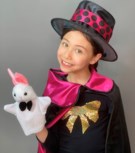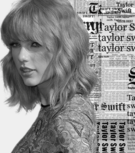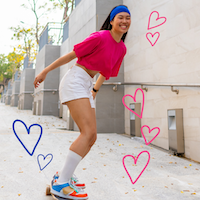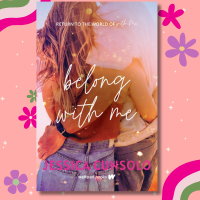TRENDING
In the News
Why the 2020 election is the most important one of our lives—and how *you* can get involved

Shelby Deibler can’t wait to cast her ballot in November. “To be part of the 2020 election as a first-time voter fills me with a sense of pride,” says Shelby, 19. “I feel like I’m going to be making a significant contribution to our American story.” Growing up, Shelby felt that she understood our country, but the 2016 presidential election alerted her to how deeply divided we are as a nation. “I blocked people on social media,” she remembers, “and I’m sure they blocked me!” Seeing Hillary Clinton win the popular vote but still lose the election sparked Shelby’s passion for politics—and also for meaningful action. Soon Shelby was attending the Women’s March in Philadelphia and going to Washington, D.C., to lobby her New Jersey representatives in support of the Equal Rights Amendment. Now, she’s ready to take her biggest political step yet—filling out her ballot.
“When you vote for someone, you are giving that person the power to make decisions on your behalf. You’re deciding who has the authority to make laws, sign orders and help write the story of your future.” And, to Shelby, there is no vote more important than this one. “No matter the outcome, the 2020 election will be a defining moment in American history. From the primaries to the pandemic, this year has brought unending chaos and uncertainty, but voting is a constant—the most direct way to create change.”
We *all* care about the future of our country and want to progress on so many of the serious issues tearing us apart—but what if you’re not old enough to vote this year? We asked teens to share how and why they got involved in politics—and how you can still affect the outcome of the 2020 election.
“I think teenagers are pretty angry right now,” says Molly Greenwold, 16. “It used to be easier to separate politics from everyday life, but not anymore. Everything feels so connected currently—and we want to have a voice.” Many recent activist movements have been fueled by young women—from Malala Yousafzai to Emma Gonzalez to Greta Thunberg. And many got their start, unsurprisingly, on social media. To Molly, social media is like a jumping-off point for political engagement: “The first step is getting informed. Learn to think critically and analyze information,” she implores. “What you see on social media or hear from a friend isn’t always the whole story.”
When you’re online, always check your source. Are you looking at an infographic directly from a government agency or politician—or have the facts been reinterpreted through a new lens? Are you checking on politicians’ voting histories—or just reading about their histories on Twitter? YouTube vids, podcasts and Insta accounts are great places to start, but branch out to include books, unbiased news sources and public records. “Recognize those politicians who have spoken up for what you believe in—and hold accountable those who haven’t,” Shelby adds.
And what if people in your life are thrown off by your sudden interest in politics? “You deserve for your voice to be heard,” Molly states. “Rely on your beliefs and stand your ground, even if someone isn’t taking you seriously.” Gwyneth Cunningham, 17, agrees. “I was worried people would think I was just hopping on a trend and not genuinely interested,” she shares, adding that girls often are criticized or demeaned when they take up a cause. But as she felt growing frustration toward both local injustices and national divisiveness, she knew she “wasn’t OK with being silent anymore.”
We get that with everything in your own world, adding “create national change” to the list can feel super overwhelming. But here’s the thing: By taking part *now* in our political process, you’re engaging with issues and decisions that are likely to affect your life for decades to come. “It’s crucial for young people to care about politics,” implores Mercedes Gordon, 15. “Issues of social justice can only be resolved through action.” Shelby agrees. “Our generation is going to be the new changemakers,” she shares. “We’ve never known a world without chaos— so it doesn’t scare us to hop in and fi ght for what we believe in. Know that we’re ready.”
But being politically active doesn’t end at just knowing the issues— it’s about actively participating in the process and standing up for what you think is right. Molly volunteers for Senate and House campaigns in Boston. Mercedes interns at the Montana Public Interest Research Group, an organization that provides young people with opportunities to work on public policy. And Gwyneth stepped up as a poll worker when her Wichita, Kan., election office needed help. “I think a lot of kids my age don’t realize working on the election is even an option,” admits Gwyneth. On her first day, she worried about seeming inexperienced next to the older poll workers. “At first I was confused, even a little scared, but it was so easy to get started.” After a three-hour training session, she spent an afternoon helping to check in voters and hand them ballots. When the day was done, she felt good about her contributions: “It’s common to feel disappointed in the outcome if you couldn’t vote,” she explains. “It felt good to be involved in some way.” Molly spent hours calling potential voters to no avail. “Nine out of 10 people won’t pick up the phone…and the tenth will yell at you,” says Molly with a laugh. “It’s hard.” Mercedes agrees: “This work is challenging and full of conflict. But it is so important.”
So what are you waiting for? Give a campaign a call—from your city council to one of the presidential candidates—and ask how someone your age can step up to help. Or join the conversation in your own community. Whether you’re sending texts to potential voters, signing up for a call bank or forming connections with classmates and neighbors around a common cause, your work is bound to make a difference. “As young people, this is our moment,” says Shelby. “Change will never be enacted unless we’re taking action. For years, we’ve been walking on a tightrope, hoping not to fall off—avoiding controversial topics, getting into arguments with those of different political affi liations, deleting heated comments off our social media. Let’s strut gracefully across that tightrope and engage in open-minded dialogue again.” And once the results are in, don’t let your excitement (or dismay) keep you from moving forward. This is just the beginning of your political journey. Someday, it could be *your* name on that ballot.
How are *you* getting involved in the 2020 election? Share with us on Twitter @girlslifemag!
Hey, girl! Just wanted to let you know that this interview originally ran in our October/November 2020 issue. Want more? Read the print mag for free *today* when you click HERE.
check these out!
you might like these
-
 It's official: Descendants: The Rise of Red has a release date (+ an all new teaser)
It's official: Descendants: The Rise of Red has a release date (+ an all new teaser)
-
 EXCLUSIVE! Sydney Mikayla is fierce and fearless in Fright Krewe's second season (and all the time, tbh)
EXCLUSIVE! Sydney Mikayla is fierce and fearless in Fright Krewe's second season (and all the time, tbh)
-
 Everything you need to know about the April 8 solar eclipse, straight from NASA
Everything you need to know about the April 8 solar eclipse, straight from NASA
-
 Our favorite moments from Coachella weekend one
Our favorite moments from Coachella weekend one

 become a contributor
become a contributor


















